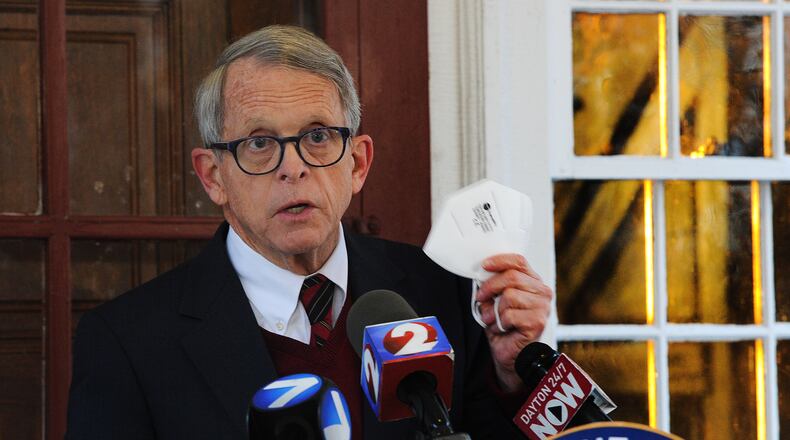The pandemic limited access to courts, where applicants must obtain records, and efforts to promote the program were put on hold, he said.
“We are trying to kick this thing back up significantly,” DeWine said.
While the governor receives hundreds of applications from prisoners — some of whom are doing time for sex offenses or murder — the expedited path is for people who made mistakes but have since become productive citizens.
“I still firmly believe there are thousands of Ohioans, maybe tens of thousands of Ohioans, who if we had all the facts in front of us, they would be granted a pardon. I’m talking about people who are already out of prison or never went to prison but the conviction is hindering them,” DeWine said.
Roughly one in three adult Americans have a criminal record — convictions, charges or arrests, according to federal data.
The Ohio Constitution authorizes the governor to issue commutations or pardons. A commutation lessens the punishment for a crime and a pardon wipes it off the person’s record.
Criminal records can limit people’s ability to find jobs or housing, gain professional licenses and access education funding.
In its first 12 months, the expedited pardon project drew 74 applications, 32 of which were accepted into the project. Nearly 1,700 hours of work have been poured into the applications by law students and faculty at OSU and University of Akron.
Despite the slow start, University of Akron Associate Clinical Professor Joann Sahl said: “It has been exciting this year to see the application, hearing and decision all come within a short time. Because usually my clients would wait years — two, three, four years (for a decision).”
Once accepted into the program, the client must track down court and police documents needed for their full pardon application. University of Akron law students and faculty then collect more documents and share the file with the Ohio Department of Rehabilitation and Correction for its review.
The Ohio Parole Board makes a recommendation on each application to the governor. DeWine reads a summary of each case; asks for more information if needed; and makes the ultimate decision.
The governor is required to wait until the parole board makes a recommendation before deciding on a clemency request. In 2020, the Parole Board received and reviewed 327 clemency requests — 134 commutations, 102 pardons and 91 reprieves. The board made favorable recommendations in 15 commutations and 18 pardons.
Sarah Ackman, DeWine’s deputy counsel, calls the person to tell them they’ve been granted a pardon. The reactions range from disbelief to tears of joy, she said.
“It’s just a really neat experience to get to deliver that kind of news,” she said.
Akron resident LaSalle Harris, 59, got the call and a hardcopy of the pardon in December.
Harris grew up as the middle child in a family of five kids. She said she committed crimes such as writing bad checks and thefts during her 23-year addiction to drugs and alcohol. She has been sober since Nov. 20, 2007, earned a bachelor’s degree, started a nonprofit that provides supportive housing, volunteers in her community and works as a recovery specialist for a mental health services agency.
The mother of four and grandmother of three heard about the expedited pardon project through a flier on campus at University of Akron.
She hopes her pardon can show others how they can turn their lives around.
“It’ll take some of the stigma off from my past and it’ll open new doors,” Harris said.
Under DeWine’s Expedited Pardon Project, applicants must:
- Not have committed any additional crimes in the past decade;
- Not have committed any disqualifying offenses, which include murder, sex crimes, child porn, domestic violence, kidnapping, terrorism;
- Have made good faith efforts to meet sentencing requirements, such as paying restitution;
- Have a post-offense employment history or a compelling reason for not working;
- Have a track record of volunteer or community service;
- Have a specific reason for seeking a pardon.
Ohioans interested in applying for an expedited pardon may email the program at: depc@osu.edu or visit the website https://www.ohioexpeditedpardon.org/ or sign up for a Jan. 22 online meeting to learn more here: https://www.eventbrite.com/e/ask-the-experts-governors-expedited-pardon-project-tickets-133358018423
About the Author

